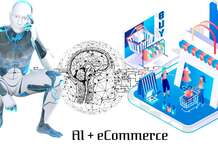Technology has been rapidly advancing over the years, and the latest development set to revolutionize the tech industry is the Metaverse. A metaverse is a virtual space where people can interact with a computer-generated environment in real time. This article will discuss the Metaverse, its potential impact on technology, and how it is being developed.
What is a Metaverse?
A metaverse is a mutual virtual shared space created by converging virtual reality (VR) and augmented reality (AR) technologies. It is a digital universe where users can interact with others and the environment. The metaverse concept was first introduced in Neal Stephenson’s novel, “Snow Crash,” and has been popularized by virtual worlds such as Second Life and Minecraft.
The Metaverse is not just a video game or a simulation but a platform for social interactions, commerce, and entertainment. It allows users to have a persistent online identity and to engage with others in a virtual space. In the Metaverse, users can create and customize their virtual avatars, build and own virtual assets, and participate in various activities such as gaming, shopping, and socializing with Metaverse consulting services.
Section 1: Potential Impact of Metaverse Development on Technology
The Metaverse is set to significantly impact technology as it is a new platform for innovation and growth. Here are some potential effects that metaverse development could have on technology:
- Augmented Reality (AR) and Virtual Reality (VR) Development: The Metaverse combines AR and VR technologies, and its outcome could lead to new advances in these areas. With the Metaverse, developers can create more immersive and interactive environments where users can experience a seamless blend of virtual and physical worlds.
- Blockchain and Cryptocurrency Development: The Metaverse is a platform for development. Users can buy, sell, and trade virtual assets using cryptocurrency, and the blockchain can be used to secure transactions and prevent fraud.
- Artificial Intelligence (AI) Development: The Metaverse also presents new opportunities for AI development. With AI, developers can create smarter virtual environments to interact with users and provide personalized experiences.
- Gaming and Entertainment: The Metaverse is already being used as a platform for gaming and entertainment, and its development could lead to new gaming and entertainment experiences. With the Metaverse, developers can create more immersive and social gaming experiences where players can interact with each other in a virtual space.
- E-Commerce Development: The Metaverse is also a platform for e-commerce development. Users can use it to buy and sell virtual goods and services, and e-commerce platforms can use the Metaverse to create more immersive and interactive shopping experiences.
How is the Metaverse Being Developed?
Several companies and organizations are leading the development of the Metaverse.
Some of the key players in metaverse development include:
- Facebook: Facebook is one of the leading companies in metaverse development. It has recently announced its plans to create a metaverse platform where users can interact with each other in virtual environments.
- Epic Games: Epic Games is the company behind the popular game Fortnite. It has also announced its plans to create a metaverse platform where users can create and share content.
- Roblox: Roblox is a popular gaming platform used to create virtual worlds. It is also working on its metaverse platforms for using virtual environments.
- Decentraland: Decentraland is a blockchain-based virtual world where users can buy, sell, and build virtual world real estate. It uses a decentralized system to govern its operations and relies on the Ethereum blockchain for its transactions.
- Second Life: Second Life is one of the oldest virtual worlds, created in 2003. It has gone through many changes over the years and has evolved into a platform that allows users to create and interact with each other in a virtual world.
These companies and organizations are working towards creating a seamless metaverse experience for users. They use advanced technologies such as blockchain, virtual and augmented reality, and artificial intelligence to develop the Metaverse. They are also exploring new ways to monetize the Metaverse, such as selling virtual world real estate and goods.
Section 2: Metaverse and eCommerce
The concept of the Metaverse has been around for a while. Still, it has recently gained more attention due to technological advancements and the growing interest in virtual reality. The convergence of physical and virtual reality created the Metaverse. It is a space where anyone can interact with others and digital objects more immersively. The Metaverse has the future to revolutionize many industries, and one of the areas where it could have a significant impact is eCommerce.
In this section, we will explore the potential of the Metaverse in eCommerce.
- Virtual Shopping
Virtual shopping is one of the most obvious applications of the Metaverse in eCommerce. In the Metaverse, users can browse virtual stores and buy products more immersive and engagingly than on traditional eCommerce platforms. Users can interact with products in 3D and get a more accurate sense of their size, shape, and texture.
- Personalization
The Metaverse also offers new opportunities for personalization in eCommerce. Creating a shopping experience tailored to the individual user is possible in a virtual environment. For example, users could be shown products that match their preferences based on their previous purchases or browsing history. This could lead to higher conversion rates and increased customer loyalty.
- Social Shopping
Social shopping is another area where the Metaverse could significantly impact eCommerce. In the Metaverse, users can use the opportunity to go for virtual shopping online and share their shopping experiences. This could lead to new opportunities for social commerce, where users can buy products based on recommendations from friends and influencers.
- Augmented Reality
Augmented reality (AR) is another technology that can enhance the eCommerce experience in the Metaverse. AR allows users to see digital objects in the real world, which could be used to create virtual showrooms or product demonstrations. For example, users could see how a piece of furniture would look in their home before they buy it.
- New Business Models
Finally, the Metaverse could also lead to new business models in eCommerce. For example, virtual stores could charge for access or offer in-world advertising opportunities with Metaverse consulting services. Additionally, eCommerce companies could create virtual products that can only be sold in the Metaverse, creating new revenue streams.
Section 3: Challenges and Opportunities
The development of the Metaverse, the virtual world seamlessly integrated with the physical world, is one of our most exciting technological frontiers. Like any emerging technology, metaverse development presents challenges and opportunities for businesses and individuals.
Section 3: In this section, we’ll look at some of these challenges and opportunities.
Here are the Challenges:
- Technical Complexity: Developing a metaverse requires high technical expertise and infrastructure. Creating a fully-realized, immersive virtual world accessible to users worldwide requires a robust technological backbone. Building and maintaining this infrastructure can be both time-consuming and costly.
- Interoperability: One of the core tenets of the Metaverse is interoperability, or the ability for different virtual worlds to connect and interact seamlessly. Achieving this level of interoperability can be challenging, as other virtual worlds may be built on different platforms or using different programming languages.
- Security: As with any online environment, the Metaverse presents potential security risks. Developers must ensure that user data is protected and that users are safe from hacking, scams, and other malicious activity.
- Ethical Concerns: The Metaverse is a new frontier regarding ethical concerns, such as privacy, identity, and free speech. Developers must navigate these complex issues to create a virtual world that is both safe and open.
Here are the Opportunities:
- New Business Models: The Metaverse presents exciting opportunities for new business models, such as the virtual world in real estate, virtual goods, and virtual experiences. Companies that quickly adapt to these new opportunities can gain a good advantage over their competitors.
- Global Access: The Metaverse allows businesses and individuals to reach a global audience easily. This opens up new markets and opportunities that were previously inaccessible.
- Enhanced User Experience: The Metaverse offers immersion and interactivity unmatched by any other technology. This improved user experience can lead to increased engagement and loyalty.
- Innovation: The Metaverse is a hotbed of innovation, with developers constantly pushing the boundaries of what is possible. This creates opportunities for businesses to develop new technologies and solutions to revolutionize their industries.
Conclusion:
The challenges and opportunities presented by metaverse development are numerous and complex. However, with the right approach and mindset, businesses and individuals can capitalize on the opportunities and overcome the challenges. By investing in the right technology and infrastructure, staying abreast of the latest developments, and remaining attuned to ethical concerns, businesses can create a safe and innovative metaverse that offers exciting new possibilities for growth and growth success.
FAQs
Q: What are some examples of Metaverse platforms?
A: Some examples of Metaverse platforms include Second Life, VRChat, Roblox, and Decentraland. These platforms allow users to create avatars, interact with other users, and explore virtual environments.
Q: What technologies are involved in Metaverse Development?
A: Metaverse Development requires various technologies, including virtual reality, augmented reality, blockchain, and artificial intelligence. These technologies work mutually to create a seamless and immersive experience for users.
Q: Will the Metaverse be easily accessible to everyone?
A: Accessibility is a concern for many developers working on the Metaverse. While the technology is still developing, efforts are underway to ensure that the Metaverse is accessible to people with disabilities and also those who do not have access to the latest technology.
Q: Will the Metaverse be safe?
A: Safety and security are important considerations for the Metaverse. Developers are working to create safe and more secure virtual environments that protect user privacy and prevent cyberbullying and harassment.
Q: Will the Metaverse replace the real world?
A: While the Metaverse may offer new and exciting opportunities for entertainment, socializing, and commerce, it’s unlikely to replace the real world. However, it may change how we interact and offer new possibilities for working, playing, and learning.
Q: When can we expect to see Metaverse technology become mainstream?
A: It’s difficult to predict when Metaverse technology will become mainstream, as it is still a relatively new concept. However, there is already significant interest and investment in this area, and we will likely see more Metaverse platforms and applications emerging in the coming years.






